2013年七年级英语
2013年新外研版七年级英语上册Module_7__Unit_1_How_do_I_write_my_homework_on_the_computer

教学目标
1.掌握本单元的单词keyboard ,mouse, screen, ------paper 及短语:connect to, turn on等。 2.掌握四会句型: 1).How do I write my homework on my computer ? 2).What do I do next? 3).Where do I write the name? 4).How do I save the document? First ,open a new document .Then ,use the mouse and click “new document”. 3.掌握一般现在时的特殊疑问句的用法。
二、翻译下列短语。 1. 连接显示器 与主机 2. 打开电脑 3. 打开一个新 文件 4. 使用键盘 5. 给它命名 6. 再点击保存 connect the monitor to the computer turn on the computer open a new document use the keyboard write a name for it click “save” again
Listen again and answer:
What does Lingling want to do on the computer? She wants to write her homework . Who is good at using the computer?
Betty
7.Find the words from the box in the conversat Write the words they go with. Work in pairs.
外研社2013版 七年级(上)英语课文原文及翻译
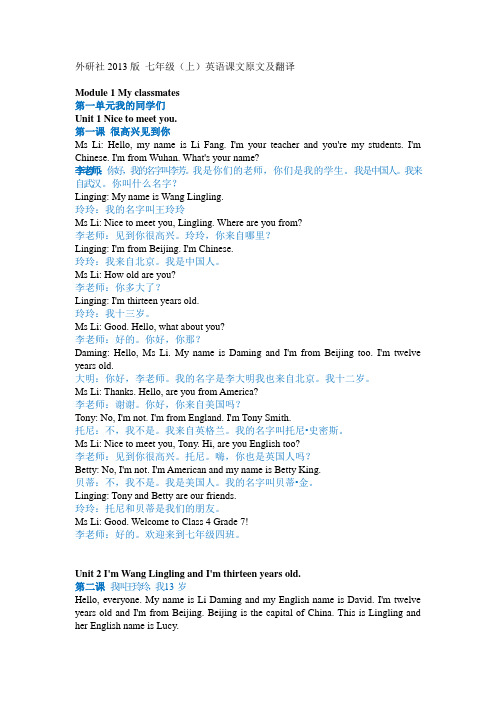
外研社2013版七年级(上)英语课文原文及翻译Module 1 My classmates第一单元我的同学们Unit 1 Nice to meet you.第一课很高兴见到你Ms Li: Hello, my name is Li Fang. I'm your teacher and you're my students. I'm Chinese. I'm from Wuhan. What's your name?李老师:你好,我的名字叫李芳。
我是你们的老师,你们是我的学生。
我是中国人。
我来自武汉。
你叫什么名字?Linging: My name is Wang Lingling.玲玲:我的名字叫王玲玲Ms Li: Nice to meet you, Lingling. Where are you from?李老师:见到你很高兴。
玲玲,你来自哪里?Linging: I'm from Beijing. I'm Chinese.玲玲:我来自北京。
我是中国人。
Ms Li: How old are you?李老师:你多大了?Linging: I'm thirteen years old.玲玲:我十三岁。
Ms Li: Good. Hello, what about you?李老师:好的。
你好,你那?Daming: Hello, Ms Li. My name is Daming and I'm from Beijing too. I'm twelve years old.大明:你好,李老师。
我的名字是李大明我也来自北京。
我十二岁。
Ms Li: Thanks. Hello, are you from America?李老师:谢谢。
你好,你来自美国吗?Tony: No, I'm not. I'm from England. I'm Tony Smith.托尼:不,我不是。
2013人教版七年级英语下册units1-12重点短语和句子及范文
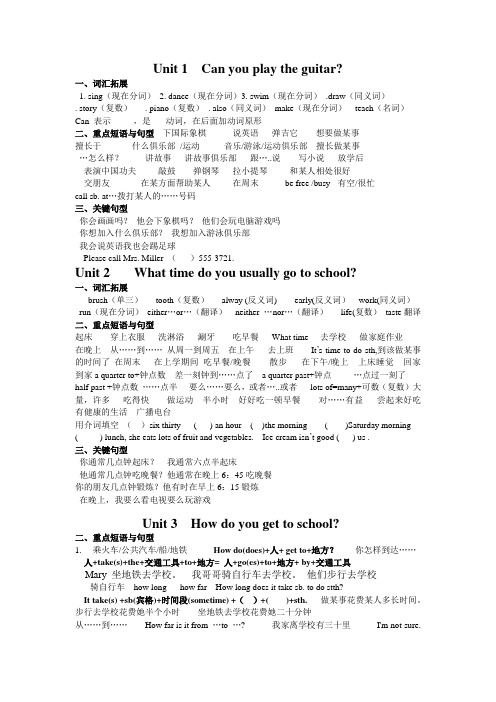
Unit 1 Can you play the guitar?一、词汇拓展1. sing(现在分词)2. dance(现在分词)3. swim(现在分词).draw(同义词). story(复数). piano(复数). also(同义词)make(现在分词)teach(名词)Can 表示- ------,是-----动词,在后面加动词原形二、重点短语与句型下国际象棋说英语弹吉它想要做某事擅长于什么俱乐部/运动音乐/游泳/运动俱乐部擅长做某事…怎么样?讲故事讲故事俱乐部跟…..说写小说放学后表演中国功夫敲鼓弹钢琴拉小提琴和某人相处很好交朋友在某方面帮助某人在周末be free /busy 有空/很忙call sb. at…拨打某人的……号码三、关键句型你会画画吗?他会下象棋吗?他们会玩电脑游戏吗你想加入什么俱乐部?我想加入游泳俱乐部我会说英语我也会踢足球Please call Mrs. Miller ()555-3721.Unit 2 What time do you usually go to school?一、词汇拓展brush(单三)tooth(复数)alway (反义词) early(反义词)work(同义词)run(现在分词)either…or…(翻译)neither …nor…(翻译)life(复数)taste翻译二、重点短语与句型起床穿上衣服洗淋浴涮牙吃早餐What time 去学校做家庭作业在晚上从……到……从周一到周五在上午去上班It’s time to do sth,到该做某事的时间了在周末在上学期间吃早餐/晚餐散步在下午/晚上上床睡觉回家到家a quarter to+钟点数差一刻钟到……点了 a quarter past+钟点…点过一刻了half past +钟点数……点半要么……要么,或者…..或者lots of=many+可数(复数)大量,许多吃得快做运动半小时好好吃一顿早餐对……有益尝起来好吃有健康的生活广播电台用介词填空()six thirty ( ) an hour ( )the morning ( )Saturday morning ( ) lunch, she eats lots of fruit and vegetables. Ice cream isn’t good ( ) us .三、关键句型你通常几点钟起床?我通常六点半起床他通常几点钟吃晚餐?他通常在晚上6:45吃晚餐你的朋友几点钟锻炼?他有时在早上6:15锻炼在晚上,我要么看电视要么玩游戏Unit 3 How do you get to school?二、重点短语与句型1. 乘火车/公共汽车/船/地铁How do(does)+人+ get to+地方?你怎样到达……人+take(s)+the+交通工具+to+地方= 人+go(es)+to+地方+ by+交通工具Mary 坐地铁去学校。
2013七年级上人教版英语Starter_Unit1_Good_morning完整课件-增加了思维导图

Good morning, Dale!
1C Practice the coversations in the picture.
Hello! Good morning.
Good morning.
Good mornin g, Miss Wang.
Good morning.
Good morning, class.
CAAC 中国民航
ID
身份证
HK
a.m./AM p.m./PM
Guessing game Do you know what these letters mean ?
Discuss in groups
比一比, 看谁反应快
Game
GOOD CAAC EGG BAG BCB CBA BBC BED Cc Ee BA BC Ff Dd Hh AD Gg Bb Aa
at night 22:00--Good night! 晚安!
Guess:
morning
afternoon evening evening
When you meet your friend in…, you can say…
15:00
7:00 am
19:00
9:00
Good morning!
Good morning!
A: Good afternoon, Dale!
B: Hi, Cindy! How are you? A: I’m fine, thanks. How are you? B: I’m OK.
I’m =I am
Pair work: Put the sentences in the right order.
汉译英: 1. 嗨,艾丽斯! Hi , Alice! 2.早上好,戴尔。 Good morning, Dale. 3.晚上好,埃里克。 Good evening, Eric.
2013新七年级英语上册
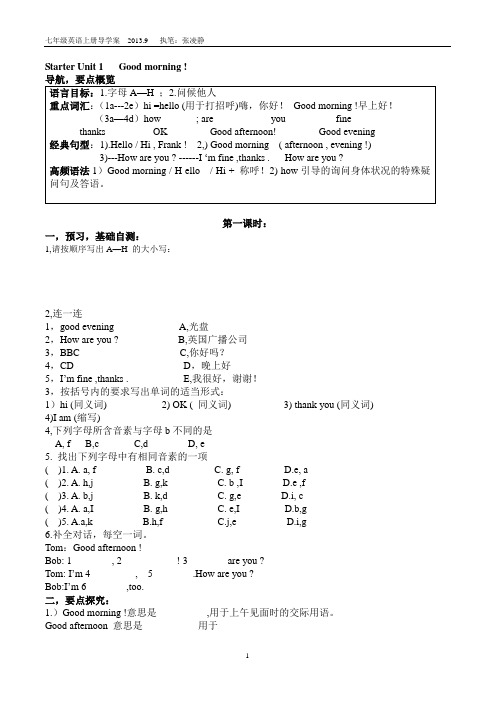
Starter Unit 1 Good morning !第一课时:一,预习,基础自测:1,请按顺序写出A—H 的大小写:------------------------------------------------------------------------------------------------------------------------------------------------------------------------------------------------------------------------------------------------------------------------------------------------------------------------------------------------------------------------------------------------------------------------------------------------------------------------------------------------------------------------------------------------------------------------ 2,连一连1,good evening A,光盘2,How are you ? B,英国广播公司3,BBC C,你好吗?4,CD D,晚上好5,I‟m fine ,thanks . E,我很好,谢谢!3,按括号内的要求写出单词的适当形式:1)hi (同义词)_________ 2) OK ( 同义词)__________ 3) thank you (同义词) _________4)I am (缩写)___________4,下列字母所含音素与字母b不同的是_____A, f B,c C,d D, e5. 找出下列字母中有相同音素的一项( )1. A. a, f B. c,d C. g, f D.e, a( )2. A. h,j B. g,k C. b ,I D.e ,f( )3. A. b,j B. k,d C. g,e D.i, c( )4. A. a,I B. g,h C. e,I D.b,g( )5. A.a,k B.h,f C.j,e D.i,g6.补全对话,每空一词。
2013年七年级英语上册首字母填空及汉语提示精选(含答案)

Unit 1 (考典)1.Nice to meet you, Mr Smith.2.Zero and six is six.3.This is a boy . His nameis Tony.4.My lucky(幸运的) numberis nine.5.---What’s your name, please?---I’m Jim.6.I think the answer(答案) is right.7.This is a clock (时钟). It’s yellow.8.This is my schoolcard(卡片).9.There are five people in myfamily(家).10.The telephone (电话) is onthe end table.Unit 21.What’s this i n English?2.This is my school ID card.3.Excuse me, Jane. Is this yourring?4.I like playing computer games.5.Look! Your pen is in thepencilcase.6.This is my pencil(铅笔). It’syellow and green.7.The dicionary(字典) is in thebackpack.8.I have a watch(手表). It’s nice.9.--- Is that a ruler(尺子)? It’snice. --- Yes, it is.Unit 31.My father’s brother ismy(I) uncle.2.These (this) are your Englishbooks.3.His cousin is (be) a studentsin this school.4.Those are herfriends(friend).5.I can see two photos(photo) on the wall.6.This picture (图画) isvery nice.7.Her son (儿子) iseight years old.8.The boy in the photo is Jane’sgrandpa(祖父).9.The pencils are (是) redand yellow.10.--- Is she your sister (姐姐)?--- Yes, she is.Unit 41.--- Where’re the boys?--- They (He) are inthe room.2.Bring me some cards(card) to me next time.3.These (this) are notcomputer games.4.My keys are (be) in thebag.5.---Is it (they) on the floor?--- Sorry, I don’t know.6.Mum (妈妈), this is myfriend, Tommy.7.Your ring is in thedrawer(抽屉).8.My baseball isunder(在……下面) the bed.9.--- Where’s your backpack?--- It’s on the chair(椅子).10.This is my hat (帽子),and it is nice.Unit 51.She has (have) an Englishbook.2.Mr Green often tells us(we) interesting stories in class.3.We have fourclasses(class) in the morning,4.My father onlywatches(watch) sports on TV.5.Let’s help them(they) clean the room.6.Do you play tennis(网球)?7.The basketball(篮球) is under the chair.8.I want to join the sportsclub(俱乐部).9.Many (许多) girlsare in the music room now.10.We play soccer every(每一)day.Unit 61.We usually have lunchat twelve.2.Wang Baoqiang is a moviestar .3. A tomato is a kind ofvegetable .4.My favorite food isnoodles(面条).5.An apple a day keepsthe doctor away.6.She likes chicken(鸡肉) for dinner.7.Emma eats (吃)breakfast at home.8.--- What would you like?--- Two humbugers(汉堡包), please.9.The girls likestrawberries(草莓) a lot.10.Have some pears (梨),please.A)根据句意和汉语提示写出各小题正确的单词。
2013人教版七年级上册英语单词表
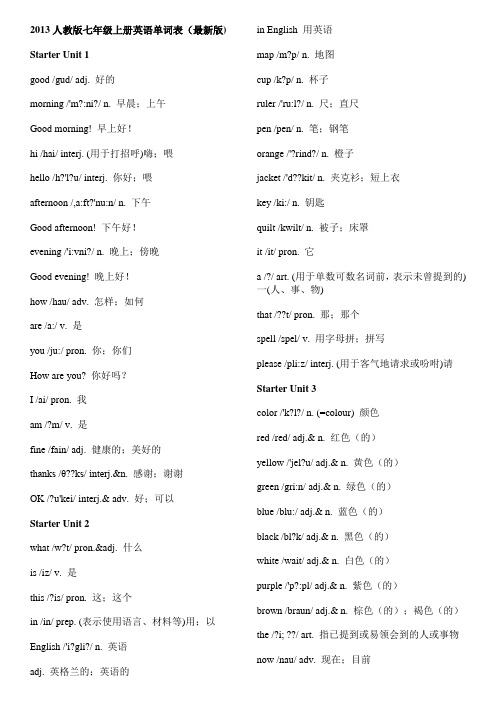
2013人教版七年级上册英语单词表(最新版) Starter Unit 1good /gud/ adj. 好的morning /'m?:ni?/ n. 早晨;上午Good morning! 早上好!hi /hai/ interj. (用于打招呼)嗨;喂hello /h?'l?u/ interj. 你好;喂afternoon /,a:ft?'nu:n/ n. 下午Good afternoon! 下午好!evening /'i:vni?/ n. 晚上;傍晚Good evening! 晚上好!how /hau/ adv. 怎样;如何are /a:/ v. 是you /ju:/ pron. 你;你们How are you? 你好吗?I /ai/ pron. 我am /?m/ v. 是fine /fain/ adj. 健康的;美好的thanks /θ??ks/ interj.&n. 感谢;谢谢OK /?u'kei/ interj.& adv. 好;可以Starter Unit 2what /w?t/ pron.&adj. 什么is /iz/ v. 是this /?is/ pron. 这;这个in /in/ prep. (表示使用语言、材料等)用;以English /'i?gli?/ n. 英语adj. 英格兰的;英语的in English 用英语map /m?p/ n. 地图cup /k?p/ n. 杯子ruler /'ru:l?/ n. 尺;直尺pen /pen/ n. 笔;钢笔orange /'?rind?/ n. 橙子jacket /'d??kit/ n. 夹克衫;短上衣key /ki:/ n. 钥匙quilt /kwilt/ n. 被子;床罩it /it/ pron. 它a /?/ art. (用于单数可数名词前,表示未曾提到的)一(人、事、物)that /??t/ pron. 那;那个spell /spel/ v. 用字母拼;拼写please /pli:z/ interj. (用于客气地请求或吩咐)请Starter Unit 3color /'k?l?/ n. (=colour) 颜色red /red/ adj.& n. 红色(的)yellow /'jel?u/ adj.& n. 黄色(的)green /gri:n/ adj.& n. 绿色(的)blue /blu:/ adj.& n. 蓝色(的)black /bl?k/ adj.& n. 黑色(的)white /wait/ adj.& n. 白色(的)purple /'p?:pl/ adj.& n. 紫色(的)brown /braun/ adj.& n. 棕色(的);褐色(的)the /?i; ??/ art. 指已提到或易领会到的人或事物now /nau/ adv. 现在;目前see /si:/ v. 理解;明白can /k?n/ modal v. 能;会say /sei/ v. 说;讲my /mai/ pron. 我的Unit 1name /neim/ n. 名字;名称nice /nais/ adj. 令人愉快的;宜人的to /tu:/ 常用于原形动词之前,表示该动词为不定式meet /mi:t/ v. 遇见;相逢too /tu:/ adv. 也;又;太your /j?:/ pron. 你的;你们的Ms. /miz/ (用于女子的姓氏或姓名前,不指明婚否)女士his /hiz/ pron. 他的and /?nd/ conj. 和;又;而her /h?:/ pron, 她的yes /jes/ interj. 是的;可以she /?i:/ pron. 她he /hi:/ pron. 他no /n?u/ interj. 不;没有;不是not /n?t/ adv. 不;没有zero /'zi?r?u/ num. 零one /w?n/ num. 一two /tu:/ num. 二three /θri:/ num. 三four /f?:/ num. 四five /faiv/ num. 五six /siks/ num. 六seven /'sevn/ num. 七eight /eit/ num. 八nine /nain/ num. 九telephone /'telif?un/ n. 电话;电话机number /'n?mb?/ n. 号码;数字phone /f?un/ n. 电话;电话机telephone/phone number 电话号码first /f?:st/ adj. 第一first name 名字last /la:st/ adj. 最后的;末尾的last name 姓friend /frend/ n. 朋友China /'t?ain?/ 中国middle /'midl/ adj. 中间的;中间school /sku:l/ n. 学校middle school 中学;初中Unit 2sister /'sist?/ n. 姐;妹mother /'m???/ n. 母亲;妈妈father /'fa:??/ n. 父亲;爸爸parent /'pe?r?nt/ n. 父(母)亲brother /'br???/ n. 兄;弟grandmother /'gr?nm???/ n. (外)祖母;奶奶;外婆;姥姥grandfather /'gr?nfa:??/ n. (外)祖父;爷爷;外公;姥爷grandparent /'gr?npe?r?nt/ n. 祖父(母);外祖父(母)family /'f?m?li/ n. 家;家庭those /??uz/ pron. 那些who /hu:/ pron. 谁;什么人oh /?u/ interj. 哦;啊these /?i:z/ pron. 这些they /?ei/ pron. 他(她、它)们well /wel/ interj. 嗯;好吧have /h?v/ v. 经受;经历Have a good day! (表示祝愿)过得愉快!bye /bai/ interj. (=goodbye)再见son /s?n/ n. 儿子cousin /'k?zn/ n. 堂兄(弟、姊、妹);表兄(弟、姊、妹)grandpa /'gr?npa:/ n. (外)祖父;爷爷;外公;姥爷mom /m?m/, /ma:m/ n. (=mum)妈妈aunt /a:nt/ n. 姑母;姨母;伯母;婶母;舅母grandma /'gr?nma:/ n.(外)祖母;奶奶;外婆;姥姥dad /d?d/ n. 爸爸uncle /'??kl/ n. 舅父;叔父;伯父;姑父;舅父daughter /'d?:t?/ n. 女儿here /hi?/ adv. (用以介绍某人或某物)这就是;在这里photo /'f?ut?u/ n. 照片of /?v, ?v/ prep. 属于(某人或某物);关于(某人或某物)next /nekst/ adj.&n. 下一个(的);接下来(的)picture /'pikt??/ n. 照片;图画girl /g?:l/ n. 女孩dog /d?g/ n. 狗Unit 3pencil /'pensl/ n. 铅笔book /buk/ n. 书eraser /i'reiz?/ n. 橡皮box /b?ks/ n. 箱;盒pencil box 铅笔盒;文具盒schoolbag /'sku:lb?g/ n. 书包dictionary /'dik??n?ri/ n. 词典;字典his /hiz/ pron. 他的mine /main/ pron. 我的hers /h?:z/ pron. 她的excuse /ik'skju:z/ v. 原谅;宽恕me /mi:/ pron. (I的宾格)我excuse me 劳驾;请原谅thank /θ??k/ v. 感谢;谢谢teacher /'ti:t??/ n. 老师;教师about //?'baut/ prep. 关于What about...?(询问消息或提出建议)......怎么样?......好吗?yours /j?:z/ pron. 你的;你们的for /f?:/ prep. 为了;给;对thank you for... 为......而感谢help /help/ v.&n. 帮助;援助welcome /'welk?m/ adj. 受欢迎的You're welcome. 别客气。
2013人教版英语七年级下UNIT11语法精讲
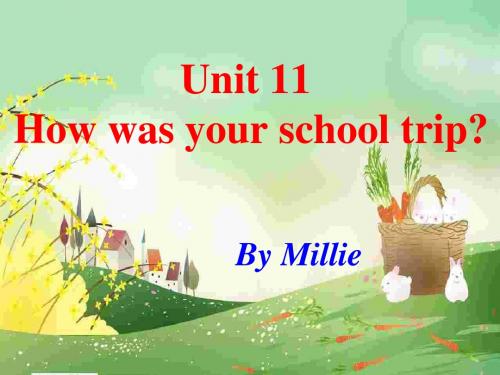
2.实义动词的一般过去时态:没有人称和数的变化 肯定句:主语+动词过去式+… I went home at eight yesterday.
三、规则动词过去式的构成
大多数动词的过去式是在动词原形后加 ed 构成。 1)一般情况下在词尾直接加 ed.如: play ― played work― worked
2)以e结尾的动词只加d. 如: like — liked love ― loved
3) 以辅音字母+y结尾的动词,变y 为i,再加ed. 如: study ― studied worry ― worried 4) 以重读闭音节结尾的动词,如果末尾只有一 个辅音字母,要双写最后这个辅音字母,再加ed. 如: stop — stopped
go for a walk
milk a cow
ride a horse
feed chickens talk with a farmer
take some photos
June
Sun Mon Tues Wedn Thurs Fri Satur 26 2 27 3 28 4 29 5 30 6 31 7 1 8
What did you ___ last weekend? do We ____________________ visited the fire station.
How was your trip last weekend? ___ It was boring.
2013人教版七年级英语下册unit1_can_you_play_the_guitar_整单元课件

Unit 1
Can you play the guitar?
sectionA
guitar
A:What can he/she do ? B:He/She can...
draw
sing
dance
swim
play chess play the guitar speak English
What can these people do? Match the activities with the people? 1.sing___ e g 2.swim___ d 3.dance___ b 4.draw___ 5.play chess___ c a 6.speak English___ f 7.play the guitar___
1.what about sth / doing sth (做)某事怎么样 What about ____(have) a rest? 2.be good at sth /doing sth = do well in 擅长(做)某事 I am good at ___(write) stories. 3.Sounds good.=That sounds good.那听起来不错 4. Let’s do sth 让我们去做某事吧 Let’s __(go) swimming.
2a Listen to these two conversations and circle the clubs you hear:
a:English club
d:chess club
e:swimming club
b:art club
C:music club
soccer club
2b Listen plete the sentences.
2013年秋新人教版七年级英语上册正式篇Unit1课件

278-6926
•What’s your telephone number, Li Xin? •It’s 281-9176.
1d
Listen and match
c 1、Tom___
a. 929-31___
2、Linda___ b. 398-61___ d 3、Bob____ c. 278-79___ b
Make a survey:
Ask three of your classmates for their phone numbers and fill in the chart.
Names Telephone numbers
Report: This is …. Her/ His phone number is ….
Put the words in order to make conversations. Then practice them. 1.your name What’s —What’s your name? Cindy I’m —I’m Cindy.
3a
2. name his What’s —What’s his name? Bob He’s —He’s Bob.
Unit 1 My name’s Gina.
(Section A 3a-Section B 1f )
1. 掌握以下单词:zero – nine, telephone, number, phone, telephone/phone number. 2. 学会询问他人名字。 3. 掌握数字的写法、读法。 4. 学会互相询问电话号码。
A: ______, I’m not. ______ Bob. I’m No
B: Hi, ______. ______ to meet you. Bob Nice
2013新版七年级英语下Unit8__there a_post_office_near_here上课用
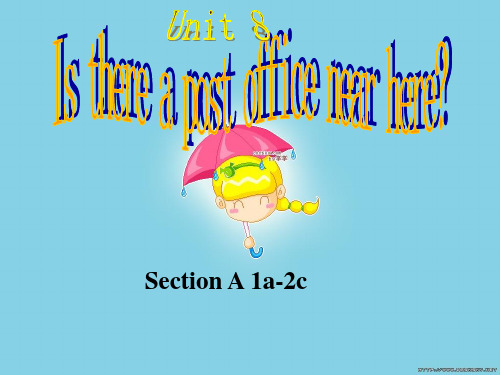
The pay phone is behind the library. The pay phone is in front of the library.
4
6
2
3
5
1
Where is the supermarket?
It’s between the hotel and the post office.
across
across : 表示从一定范围的一边到另一边,动作在物体表面进行
Center Street
go through the forest/park
through :从中间穿过,动作在里面进行
First, go straight.
Then, turn right.
Next, turn left. Last, go straight.
Section A 2d-3c
A: Excuse me, is there a hospital near here? B: Yes, there is. A: Where is it? B: It’s across from Hangzhouwan Middle School. A: Thanks a lot. B: You’re welcome.
汽车站在河对面。
2) The fruit shop is opposite the post office.
水果店在邮局对面。
4. between 介词, 表示“在„„中间”, 常与and 连接, 构成短语。例如:
I sit between Lucy and Lily.
我坐在露西和莉莉中间。
among 也表示“在„„中间”, 但是between
Let’s learn other words about the places
2013秋人教版七年级下册英语知识点及单词
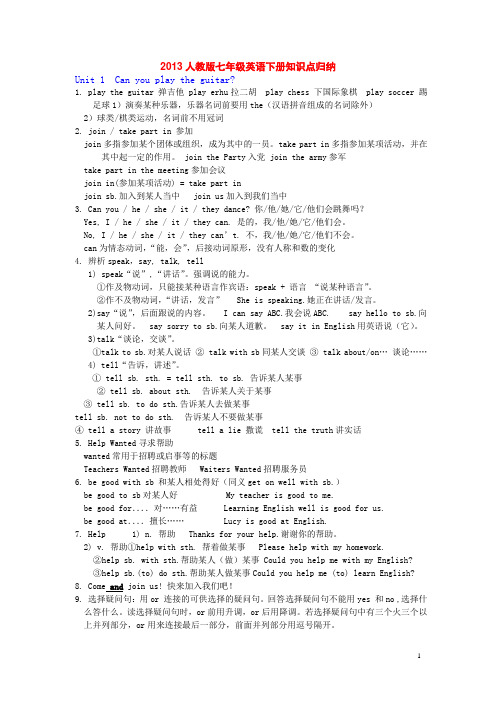
2013人教版七年级英语下册知识点归纳Unit 1 Can you play the guitar?1. play the guitar 弹吉他 play erhu拉二胡 play chess 下国际象棋 play soccer 踢足球1)演奏某种乐器,乐器名词前要用the(汉语拼音组成的名词除外)2)球类/棋类运动,名词前不用冠词2. join / take part in 参加join多指参加某个团体或组织,成为其中的一员。
take part in多指参加某项活动,并在其中起一定的作用。
join the Party入党 join the army参军take part in the meeting参加会议join in(参加某项活动) = take part injoin sb.加入到某人当中 join us加入到我们当中3. Can you / he / she / it / they dance? 你/他/她/它/他们会跳舞吗?Yes, I / he / she / it / they can. 是的,我/他/她/它/他们会。
No, I / he / she / it / they can’t. 不,我/他/她/它/他们不会。
can为情态动词,“能,会”,后接动词原形,没有人称和数的变化4. 辨析speak,say, talk, tell1) speak“说”,“讲话”。
强调说的能力。
①作及物动词,只能接某种语言作宾语:speak + 语言“说某种语言”。
②作不及物动词,“讲话,发言” She is speaking.她正在讲话/发言。
2)say“说”,后面跟说的内容。
I can say ABC.我会说ABC. say hello to sb.向某人问好。
say sorry to sb.向某人道歉。
say it in English用英语说(它)。
3)talk“谈论,交谈”。
①talk to sb.对某人说话② talk with sb同某人交谈③talk about/on…谈论……4) tell“告诉,讲述”。
人教版2013新目标七年级下册英语单词
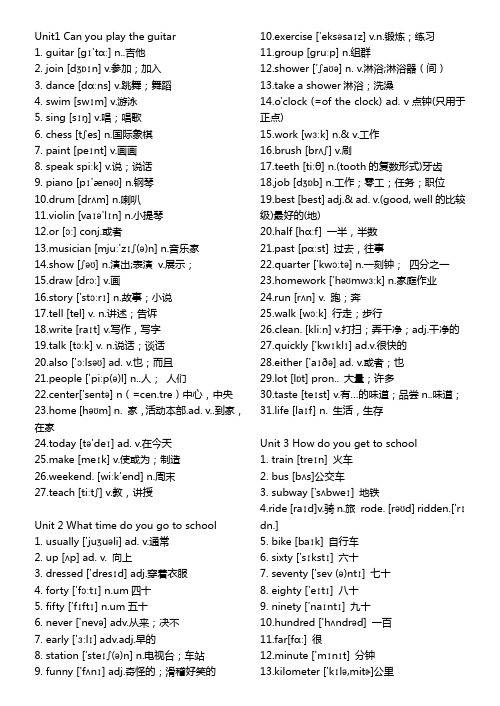
Unit1 Can you play the guitar1. guitar [gɪ'tɑː] n..吉他2. join [dʒɒɪn] v.参加;加入3. dance [dɑːns] v.跳舞;舞蹈4. swim [swɪm] v.游泳5. sing [sɪŋ] v.唱;唱歌6. chess [tʃes] n.国际象棋7. paint [peɪnt] v.画画8. speak spiːk] v.说;说话9. piano [pɪ'ænəʊ] n.钢琴10.drum [drʌm] n.喇叭11.violin [vaɪə'lɪn] n.小提琴12.or [ɔː] conj.或者13.musician [mjuː'zɪʃ(ə)n] n.音乐家14.show [ʃəʊ] n.演出;表演v.展示;15.draw [drɔː] v.画16.story ['stɔːrɪ] n.故事;小说17.tell [tel] v. n.讲述;告诉18.write [raɪt] v.写作,写字19.talk [tɔːk] v. n.说话;谈话20.also ['ɔːlsəʊ] ad. v.也;而且21.people ['piːp(ə)l] n..人;人们22.center['sentə] n(=cen.tre)中心,中央23.home [həʊm] n. 家,活动本部.ad. v..到家,在家24.today [tə'deɪ] ad. v.在今天25.make [meɪk] v.使或为;制造26.weekend. [wiːk'end] n.周末27.teach [tiːtʃ] v.教,讲授Unit 2 What time do you go to school1. usually ['juʒuəli] ad. v.通常2. up [ʌp] ad. v. 向上3. dressed ['dresɪd] adj.穿着衣服4. forty ['fɔːtɪ] n.um四十5. fifty ['fɪftɪ] n.um五十6. never ['nevə] adv.从来;决不7. early ['ɜːlɪ] adv.adj.早的8. station ['steɪʃ(ə)n] n.电视台;车站9. funny ['fʌnɪ] adj.奇怪的;滑稽好笑的10.exercise ['eksəsaɪz] v.n.锻炼;练习11.group [gruːp] n.组群12.shower ['ʃaʊə] n. v.淋浴;淋浴器(间)13.take a shower淋浴;洗澡14.o'clock (=of the clock) ad. v点钟(只用于正点)15.work [wɜːk] n.& v.工作16.brush [brʌʃ] v.刷17.teeth [tiːθ] n.(tooth的复数形式)牙齿18.job [dʒɒb] n.工作;零工;任务;职位19.best [best] adj.& ad. v.(good, well的比较级)最好的(地)20.half [hɑːf] 一半,半数21.past [pɑːst] 过去,往事22.quarter ['kwɔːtə] n.一刻钟;四分之一23.homework ['həʊmwɜːk] n.家庭作业24.run [rʌn] v. 跑;奔25.walk [wɔːk] 行走;步行26.clean. [kliːn] v.打扫;弄干净;adj.干净的27.quickly ['kwɪklɪ] ad.v.很快的28.either ['aɪðə] ad. v.或者;也29.lot [lɒt] pron.. 大量;许多30.taste [teɪst] v.有…的味道;品尝n..味道;31.life [laɪf] n. 生活,生存Unit 3 How do you get to school1. train [treɪn] 火车2. bus [bʌs]公交车3. subway ['sʌbweɪ] 地铁4.ride [raɪd]v.骑n.旅rode. [rəʊd] ridden.['rɪdn.]5. bike [baɪk] 自行车6. sixty ['sɪkstɪ] 六十7. seventy ['sev (ə)ntɪ] 七十8. eighty ['eɪtɪ] 八十9. ninety ['naɪntɪ] 九十10.hundred ['hʌndrəd] 一百11.far[fɑː] 很12.minute ['mɪnɪt] 分钟13.kilometer ['kɪlə,mitɚ]公里14.new [njuː] 新的15.every ['evrɪ] 每一个16.by [baɪ] 通过,被17.drive [draɪv] 开车18.live [lɪv] 活的,生动的19.stop [stɒp] 停止20.cross [krɔs] 交叉21.river ['rɪvə] 河,江22.many ['menɪ]许多23.village [' vɪlɪdʒ] 村庄,村民24.between [bɪ'twiːn] 介于…之间25.bridge [brɪdʒ] 桥26.boat [bəʊt] 小船27.ropeway ['rop,we] n. 索道空中缆索28.year [jɪə] n. 年;年度;岁29.afraid [ə'freɪd] 害怕;惧怕30.like [laɪk] 像;怎么样(介词)31.leave [liː v] 离开;left [left](leave的过去式)32.dream [driːm] 梦想;睡梦33.true[truː] 真的;符合实际的Unit 4 Don’t eat in class1. rule[ruːl] 规则;规章2. arrive [ə'raɪv] 到达3. hallway ['hɔːlweɪ] 走廊;过道4. hall [hɔːl]大万礼堂5. listen ['lɪs(ə)n]听;倾听6. fight [faɪt] 打架;战斗7. sorry ['sɒrɪ]抱歉的;难过的;惋惜的8. outside [aʊt'saɪd] ad. v.在外面adj.外面的9. wear [weə] 穿;戴10.important [ɪm'pɔːt(ə)nt] 重要的11.bring [brɪŋ] 带来;取来12.player ['pleɪə]播放机;运动员13.uniform ['juːnɪfɔːm] 校服;制服14.quiet ['kwaɪət] 安静的15.out [aʊt] 外出16.dish [dɪʃ] 碟;盘dishes ['diʃiz]17.night [naɪt] 晚上18.before [bɪ'fɔː]prep.conj在…以前ad v.以前19.dirty ['dɜːtɪ] 脏的20.kitchen ['kɪtʃɪn] 厨房21.more [mɔː] 更多的22.noisy ['nɒɪzɪ] 吵闹的23.relax [rɪ'læks] 放松;休息24.read [riːd] 读;阅读25.terrible['terɪb(ə)l] 非常讨厌的;可怕的26.feel [fiːl] 感受;觉的27.strict [strɪkt] 严格的;严厉的28.remember [rɪ'membə] 记住;记起29.follow ['fɒləʊ] 遵循;跟随30.luck [lʌk] 幸运;运气31.keep [kiːp] 保持;保留32.hair [heə] 头发;毛发33.learn [lɜːn] 学习;学会Unit 5 What do you like pandas1. tiger ['taɪgə] n.老虎2. elephan.t ['elɪf(ə)n.t] n. 大象3. koala [kəʊ'ɑːlə] n. 树袋熊4. panda ['pændə] n. 熊猫5. lion ['laɪən] n.狮子6. giraffe [dʒə'rɑ:f] n. 长颈鹿7. cute [kjuːt] adj可爱的;机灵的8. lazy ['leɪzɪ] 懒散的;懒惰的9. smart [smɑːt] adj 聪明的10.beautiful ['bjuːtɪfʊl] adj 美丽的;美好的11.scary ['skeərɪ] adj吓人的;恐怖的12.kind [kaɪn.d] n. 种类13.Australia [ɒ'streɪlɪə] n. 澳大利亚14.south [saʊθ] adj 南方的n. 南;南方15.Africa ['æfrɪkə] n.非洲16.pet [pet] n. 宠物17.leg [leg] n. 腿18.cat [kæt] n. 猫19.sleep [sliːp] n.睡觉20.animal ['ænɪm(ə)l] n. 动物21.friendly ['fren(d)lɪ] adj 友好的22.shy [ʃaɪ] adj 羞怯的;腼腆的23.save [seɪv] v. 救;救助24.symbol ['sɪmb(ə)l] n.象征25.flag [flæg]n. 旗;旗帜26.forget [fə'get] v.忘记;旗杆27.place [pleɪs] n. 地点;位置28.water ['wɔːtə] n.水29.danger ['deɪn(d)ʒə] n. 危险30.cut [kʌt] v. 砍;切31.down [daʊn] ad. v.(坐躺倒)下32.tree [triː] n. 树33.kill [kɪl] v.杀死;弄死34.ivory ['aɪv(ə)rɪ] n.象牙35.over ['əʊvə] prep. 超过;多于在… 上方36.zoo [zuː] n.动物园Unit6 I’m watching TV1. newspaper ['n.juːzpeɪpə] n.报纸2. use [juːz] v.使用;运用3. soup [suːp] n.汤4. wash [wɒʃ] v.洗5. movie ['muːvɪ] n.电影6. just [dʒʌst] adv. 只是;恰好7. house [haʊs] n.房子8. drink [drɪŋk] v.喝n..饮料9. tea [tiː] n.茶;茶叶10.tomorrow [tə'mɒrəʊ] ad. v.在明天11.pool [puːl] n.(复数pools)游泳池12.shop [ʃɒp] v.购物13.supermarket ['suːpəmɑːkɪt] n. 超市14.man [mæn] n.男人;人15.host [həʊst] n.主人;东道主16.study ['stʌdɪ] v. n.学习;研究17.state [steɪt] n. 洲18.the United States [ði juˈnaɪtɪd stets]美国;美利坚合众国19.American adj美国的;美洲的n.美国人;美洲人20.dragon ['dræg(ə)n] n.龙21.young [jʌŋ] 幼小的,年轻的22.race [reɪs] 竞赛23.any ['enɪ] 任何一个.任一的24.other ['ʌðə] adj另外的25.children ['tʃɪldrən] n. 儿童26.miss [mɪs] 怀念.思念27.wish [wɪʃ] v. 希望28.delicious [dɪ'lɪʃəs] adj 可口的.美味的29.still [stɪl] ad. v. 还.仍然30.living room ['lɪvɪŋ ru:m] 客厅Unit 7 It's raining!1. rain [reɪn] 下雨;雨水2. windy ['wɪndɪ] 多风的3. cloudy ['klaʊdɪ] 多云的4. sunny ['sʌnɪ] 晴朗的5. snow [snəʊ]下雪;雪6. weather ['weðə] 天气7. cook [kʊk] 做饭8. bad [bæd] 坏的;糟的9. park [pɑːk] 公园10.message ['mesɪdʒ]信息;消息11.take a message捎个口信;传话12.him[hɪm]他(he的宾格)13.could[kʊd] 能;可以14.back [bæk] 回来;回原处15.call(sb)back回电话16.problem ['prɒbləm] 困难;难题17.again [ə'gen; ə'geɪn] 再一次;又一次18.dry [draɪ]干燥的19.cold [kəʊld] 寒冷的;冷的20.hot [hɒt] 热的21.warm [wɔːm] 温暖的22.visit ['vɪzɪt] 拜访;参观23.Canada ['kænədə]加拿大24.summer ['sʌmə] 夏天;夏季25.sit [sɪt] 坐26.juice [dʒuːs] 果汁;饮料27.soon [suːn] 不久;很快28.vacation [və'keɪʃ(ə)n] 假期29.on (a) vacation 度假30.hard [hɑːd]努力地;困难的31.Europe ['jʊrəp] 欧洲32.mountain ['maʊntɪn] 高山33.country ['kʌntrɪ] 国;国家34.skate [skeɪt] 滑冰35.snowy ['snəʊɪ] 下雪的36.winter ['wɪntə] 冬天;冬季37.Russian ['rʌʃ(ə)n]俄国的;俄国人;俄语38.snowman ['snəʊmæn]雪人39.rainy ['reɪnɪ] 阴雨的;多雨的40.Joe [dʒəʊ] 乔41.Jeff [dʒef] 杰夫42.Moscow ['mɔskəʊ] 莫斯科43.Toronto [tə'rɑnto] n. 多伦多44.Boston ['bɔstən] 波士顿Unit 8 Is there a post office near here?1. post [pəʊst] 邮政2. office['ɒfɪs] 办公室3. post office邮局4. police [pə'liːs] 警察5. police station ['steɪʃən] 警察局6. hotel [həʊ'tel] 旅店;酒店7. restaurant ['restrɒnt] 餐馆8. bank [bæŋk] 银行9. hospital ['hɒspɪt(ə)l]医院10.street [striːt] 大街11.pay [peɪ] 付费12.payphone ['peifəun] 付费电话13.near[nɪə] 在……附近14.across [ə'krɒs] 过;穿过15.across from在……对面16.front [frʌnt] 前面17.in front of在……前面18.behind [bɪ'haɪnd] 在……后面19.town [taʊn]镇;市镇20.around [ə'raʊnd] 到处;大约21.north [nɔːθ] 北;北方;北方的22.along [ə'lɒŋ] 沿着23.go along沿着(这条街)走24.turn [tɜːn]转向;翻25.right [raɪt] 向右边;右边26.left [left] 向左边;左边27.rurn right向右.左转28.crossing ['krɒsɪŋ] 十字路口29.neighborhood ['neɪbə,hʊd] 街区;街坊30.spend [spend] 花(时间.钱等)31.spend time花时间32.climb [klaɪm]爬33.road [rəʊd] 路34.often ['ɒf(tə)n] 时常;常常35.air [eə] 空气36.sun shine[sʌn ʃaɪn]阳光37.free [friː]免费的38.enjoy [ɪn'dʒɒɪ] 享受;喜爱39.enjoy reading['riːdɪŋ 'riːdɪŋ] 喜欢阅读40.easily ['iːzɪlɪ] 容易地41.money ['mʌnɪ] 钱Unit 9 What does he look like?1. curly ['kɜːlɪ]卷曲的2. straight [streɪt] 直的3. tall [tɔːl] 高的4. medium ['miːdɪəm] 中等的5. height [haɪt] 身高;高度6. of medium height中等身高7. thin [θɪn] 瘦的8. heavy ['hevɪ] 重的9. build [bɪld] 身材10.of medium build中等身材11.tonight [tə'naɪt] 今夜12.little ['lɪt(ə)l] 小的13.a little一点,少量14.cinema['sɪnɪmə] 电影院15.glasses ['glɑːsɪz] 眼镜ter ['leɪtə] 以后17.handsome ['hæns(ə)m] 英俊的18.actor ['æktə] 演员19.actress['æktrɪs] 女演员20.person ['pɜːs(ə)n]人21.nose [nəʊz] 鼻子22.blonde [blɒnd] adj. 金黄色的23.mouth [maʊθ] 嘴24.round [raʊnd]圆形的25.face [feɪs] 脸26.eye [aɪ] 眼睛27.singer ['sɪŋə(r)] 歌手28.artist ['ɑːtɪst] 艺术家29.crime [kraɪm] 犯罪活动30.criminal ['krɪmɪn(ə)l] 犯罪31.put [pʊt] 放32.each [iːtʃ] 每个,各自33.way [weɪ] 方式,路线34.describe [dɪ'skraɪb] 描述35.differently ['dɪfərəntlɪ] 不同的36.another[ə'nʌðə] 另一,又一37.end [end] 结尾,尽头38.in the end最后39.real [riːl] 真正的40.jeans [dʒinz] 牛仔裤41.Johnny ['dʒɒnɪ] 约翰尼42.Dean [din] 迪安43.Tina ['tinə]蒂娜44.Jackson ['dʒæksn] 杰克逊Unit 10 I'd like some noodles1. noodle ['nuːd(ə)l] 面条2. mutton ['mʌt(ə)n] 羊肉3. beef [biːf] 牛肉4. cabbage [ˈkæbɪdʒ] 卷心菜;洋白菜5. potato [pə'teɪtəʊ] 土豆;马铃薯6. special ['speʃ(ə)l] 特色菜;特价品;特别的;特殊的7. would [wʊd; wəd] (表示意愿)愿意8. would like愿意;喜欢9. yet [jet](常用于否定句或疑问句)还;仍然rge[lɑːdʒ]大号的;大的11.order ['ɔːdə] 点菜;命令12.take one's order点菜13.size [saɪz] 大小;尺码14.bowl[bəʊl] 碗15.one (large) bowl of一(大)碗16.tofu ['təʊfuː] 豆腐17.meat [miːt] (可食用的)肉18.dumpling ['dʌmplɪŋ] 饺子19.porridge ['pɒrɪdʒ] 粥;面糊20.onion ['ʌnjən] 洋葱21.fish [fɪʃ] 鱼;鱼肉22.pancake ['pænkeɪk]烙饼;薄饼23.world [wɜːld] 世界24.around [ə'raʊnd] the world世界各地25.answer ['ɑːnsə] 答案;回答26.different ['dɪf(ə)r(ə)nt]不同的27.cake [keɪk] 蛋糕28.candle ['kænd(ə)l] 蜡烛29.age [eɪdʒ] 年龄30.make a wish [wɪʃ] 许愿31.blow [bləʊ] 吹32.blow out吹灭33.if[ɪf]如果34.will [wɪl] 会35.the UK(等于the United Kingdom)英国35.candy ['kændɪ] 糖果37.lucky['lʌkɪ]幸运的38.popular['pɒpjʊlə]受欢迎的;普遍的39.get popular受欢迎;流行40.cut up[kʌt ʌp]切碎41.idea [aɪ'dɪə] 想法;主意42.bring good luck[lʌk] to…给……带来好运Unit11 How was your school trip?1. milk [mɪlk] 挤奶2. cow[kaʊ] n. 奶牛,母牛3. milk a cow给奶牛挤奶4. horse [hɔːs] 马5. ride [raɪd] a horse骑马6. feed [fiːd] 喂养;饲养7. feed chickens ['tʃɪkɪns] 喂鸡8. farmer ['fɑːmə] 农民;农场主9. quite [kwaɪt] 相当;安全10.quite a lot(of…) 许多11.anything ['enɪθɪŋ] (常用于否定句或疑问句)任何东西;任何事物12.grow [grəʊ] 种植;生长;发育13.farm [fɑːm] 农场;务农;种田14.pick [pɪk] 采;摘15.excellent ['eks(ə)l(ə)nt]极好的;优秀的16.countryside ['kʌntrɪsaɪd] 乡村;农村17.in the countryside在乡下;在农村18.yesterday ['jestədeɪ; -dɪ] 昨天19.flower ['flaʊə] 花20.worry ['wʌrɪ] 担心;担忧21.luckily ['lʌkɪlɪ] 幸运地;好运地22.sun [sʌn] 太阳23.museum [mjuː'zɪəm] 博物馆24.fire ['faɪə] 火灾25.fire station ['steɪʃ(ə)n] 消防站26.painting ['peɪntɪŋ] 油画;绘画27.exciting [ɪk'saɪtɪŋ; ek-]使人兴奋的;令人激动的28.lovely ['lʌvlɪ] 可爱的29.expensive [ɪk'spensɪv; ek-] 昂贵的30.cheap[tʃiːp] 廉价的;便宜的31.slow [sləʊ] 缓慢的;迟缓的32.fast [fɑːst] 快地(的)33.robot ['rəʊbɒt] 机器人34.guide [gaɪd] 导游;向导35.gift [gɪft] 礼物;赠品36.all in all总的说来37.everything ['evrɪθɪŋ] 一切;所有事物38.interested ['ɪnt(ə)rɪstɪd] 感兴趣的39.be interested in对……感兴趣40.dark [dɑːk] 黑暗的;昏暗的41.hear(heard)[hɪə] 听到;听见42.Carol ['kær(ə)l] 卡罗尔Unit12 What did you do last weekend?1. camp [kæmp]扎营2. lake [leɪk] 湖,湖泊3. beach [biːtʃ] 海滩,沙滩4. badminton ['bædmɪnt(ə)n] 羽毛球运动5. sheep [ʃiːp] 羊,绵羊6. as [æz; əz] 作为,当做7. natural['nætʃ(ə)r(ə)l] adj. 自然的8. butterfly ['bʌtəflaɪ]蝴蝶9. tired [taɪəd] 疲倦的10.stay [steɪ] 停留11.stay up late [leɪt] 深夜不留12.away [ə'weɪ] 离开13.run away跑开14.mouse [maʊs] 老鼠15.baby ['beɪbɪ] 幼小的16.shout [ʃaʊt] 呼叫,喊叫17.shout at…冲……大声叫嚷18.woof [wʊf] (狗叫声)汪汪nguage ['læŋgwɪdʒ] 语言20.fly [flaɪ] 飞21.kite [kaɪt] 风筝22.fly a kite放风筝23.high [haɪ] 高的(地)24.high school中学25.ago [ə'gəʊ] 以前26.India ['ɪndɪə] 印度27.tent [tent] 帐篷28.put up搭起,举起29.moon[muːn]月亮30.surprise [sə'praɪz] 惊奇,惊讶31.get a surpris吃惊32.snake [sneɪk] 蛇33.scared [skeəd] 惊慌的34.move [muːv] 移动35.shout to…对……大声喊叫36.start [stɑːt]开始,着手37.jump [dʒʌmp] 跳跃38.up and down上上下下39.wake [weɪk] 弄醒,醒40.into ['ɪntʊ; 'ɪntə] 到……里面41.forest ['fɒrɪst] 森林42.ear [ɪə] 耳朵43.Lucy ['lusi] 露西。
2013年版人教新目标七年级英语下册Units4-6重点短语句型

七年级英语Units4-6短语和句子Unit 4一、词组1.follow the rules 遵守规则2.break /br eɪk/ the rules 违反规则3.迟倒arrive /be late4.be on time 准时,按时5.arrive/be late for… 做……做……迟倒6.be on time for … 按时做……7.run in the hallways在走道里奔跑8.eat in the dining hall/room 在餐厅里吃9.listen to the teacher 听老师讲10.fight with sb同……打架11.wear a hat 戴帽子12.bring…to… 把……带到……来13.bring your dictionary to school把你的词典带到学校来14.take…to…把……带到……去15.take these books to the classroom.把这些书带到教室里去16.wear a school uniform 穿校服17.be/keep quiet保持安静18.go out 出去19.practice speaking English练习讲英语20.do /wash the dishes.洗餐具21.before breakfast早餐前22.make one’s/the bed整理床铺,铺床23.feel like doing sth.想做某事24.want to do sth.想做某事25.feel happy.感到快乐26.be strict with sb.对某人要求严格27.be strict in sth.对某事要求严格28.remember to do sth.记着要做某事29.remember doing sth.记着做过某事30.keep the classroom clean.保持教室干净31.know learn/about /know了解,得悉32.learn from sb.向某人学习33.learn to do sth.学会做某事/学习做某事34.listen to music听音乐35.my first day at school.我第一天上学36.some of the rules其中一些规则37.see friends见朋友38.help one’s mom(to)make breafast帮妈妈做早餐39.on school nights在学习日的晚上40.on School days在学习的日子41.every Saturday 每星期六42.too many rules太多的规则43.too much time太多的时间44.think about考虑,思考45.make rules to help us制订规则来帮我们46.keep one’s hair short 留短发47.have fun/have a good time玩得高兴48.get sth for sb 为某人弄某物49.get there 到那儿50.want sb to do sth想要某人做某事51.school rules校规52.watch a basketball game/match看蓝球赛53.this moring 今天早上54.in class课堂上二.句子1.Don’t run in the hall ways.不要在走道里奔跑2.What are the rules?规则是什么?3.Don’t arrive/be late for class.不要上课迟到4.Finish your homework on time.要按时完成作业5.We must be on time for class.我们必须按时上课6.You have to be quiet in the library.在图书馆里你必须保持安静7.Does he have to wear a uniform at school ?在校他必须穿校服吗?Yes,he does.是的,必须8.Can we wear a hat in class?课堂上我们能戴帽子吗?No,you /we can’t 不,不能。
2013春新人教版七年级英语下册全课文翻译
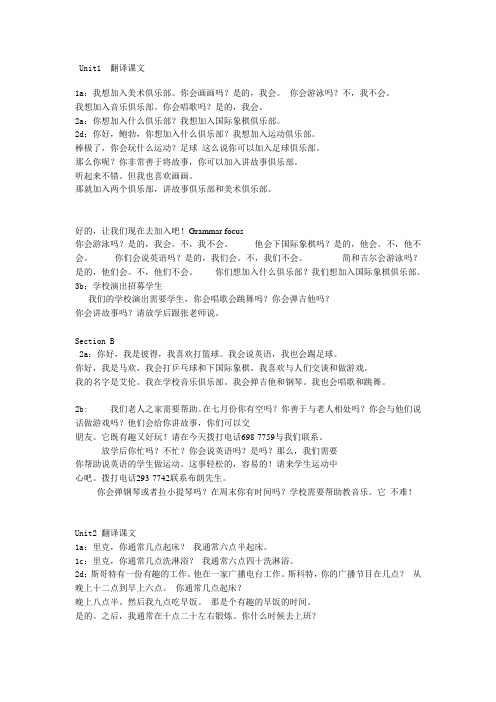
Unit1 翻译课文1a:我想加入美术俱乐部。
你会画画吗?是的,我会。
你会游泳吗?不,我不会。
我想加入音乐俱乐部。
你会唱歌吗?是的,我会。
2a:你想加入什么俱乐部?我想加入国际象棋俱乐部。
2d:你好,鲍勃,你想加入什么俱乐部?我想加入运动俱乐部。
棒极了,你会玩什么运动?足球这么说你可以加入足球俱乐部。
那么你呢?你非常善于将故事,你可以加入讲故事俱乐部。
听起来不错。
但我也喜欢画画。
那就加入两个俱乐部,讲故事俱乐部和美术俱乐部。
好的,让我们现在去加入吧!Grammar focus你会游泳吗?是的,我会。
不,我不会。
他会下国际象棋吗?是的,他会。
不,他不会。
你们会说英语吗?是的,我们会。
不,我们不会。
简和吉尔会游泳吗?是的,他们会。
不,他们不会。
你们想加入什么俱乐部?我们想加入国际象棋俱乐部。
3b:学校演出招募学生我们的学校演出需要学生,你会唱歌会跳舞吗?你会弹吉他吗?你会讲故事吗?请放学后跟张老师说。
Section B2a:你好,我是彼得,我喜欢打篮球。
我会说英语,我也会踢足球。
你好,我是马欢,我会打乒乓球和下国际象棋。
我喜欢与人们交谈和做游戏。
我的名字是艾伦。
我在学校音乐俱乐部。
我会弹吉他和钢琴。
我也会唱歌和跳舞。
2b: 我们老人之家需要帮助。
在七月份你有空吗?你善于与老人相处吗?你会与他们说话做游戏吗?他们会给你讲故事,你们可以交朋友。
它既有趣又好玩!请在今天拨打电话698-7759与我们联系。
放学后你忙吗?不忙?你会说英语吗?是吗?那么,我们需要你帮助说英语的学生做运动。
这事轻松的,容易的!请来学生运动中心吧。
拨打电话293-7742联系布朗先生。
你会弹钢琴或者拉小提琴吗?在周末你有时间吗?学校需要帮助教音乐。
它不难!Unit2 翻译课文1a:里克,你通常几点起床?我通常六点半起床。
1c:里克,你通常几点洗淋浴?我通常六点四十洗淋浴。
2d:斯哥特有一份有趣的工作。
他在一家广播电台工作。
斯科特,你的广播节目在几点?从晚上十二点到早上六点。
新版2013新目标英语七年级上Unit4_Don't_eat_in_class课件PPT(2013年春)
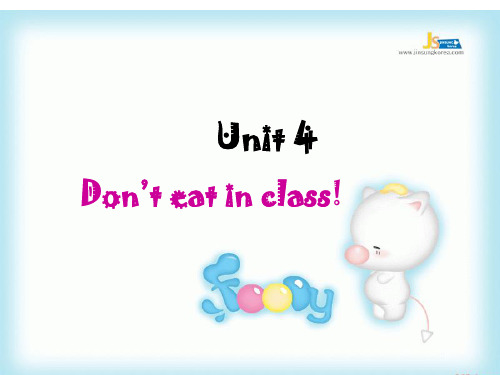
2. ___ listen to music in the music room
can can can can can can
can’t can’t can’t can’t can’t can’t
√ 8.√ ___ fight
2b. Listen again. Can Alan and Cindy do these activities? Circle “can” or “can’t” above.
Don’t fight. Don’t sleep in class.
Watch a segment of “逃学威龙” and see what rules they are breaking ?(他们违反了哪些规章制度) Don’t fight.
Don’t sleep in class. Don’t play basketball in the classroom. Don’t arrive late for class. Don’t smoke. (吸烟) Don’t wear hats Don’t drink.
Come in, please! 请进! Sit down, please. 请坐。
Let's go home. 我们回家吧。
否定的祈使句是在动词原形前(即句首)加Don't. e.g. Don't talk in class! 不要在课常上讲话! Don't open the window! 别开窗! Don’t arrive late for school. 上学别迟到 ! Don’t smoke! /No smoking ! 别吸烟!
2013年春人教版七年级下英语unit3_How_do_you_get_to_school___Section_A1

• • • •
4) How long does the bus ride take?
__________________________________
It takes about 20 minutes.
5) How long does it take Jane to get to school? __________________________________
A: How do you get to school? B: Well, I usually walk but sometimes I take the bus. A: How long does it take? B: It takes about 25 minutes to walk and 10 minutes by bus.
= Lin Zhiying usually gets to work
on foot.
Game time
考考你的记忆力!
32
40
41
50
60
46 58 61 forty-six fifty-eight sixty-one
2a Listen and repeat. Then write the
correct number next to the word.
walk
It takes thirty minutes. It takes ten minutes.
30+10 = 40 It takes forty minutes.
How long does it take you from your home to school? It takes me 10 minutes to get to school by bus.
2013教材七年级英语上册(人教版)
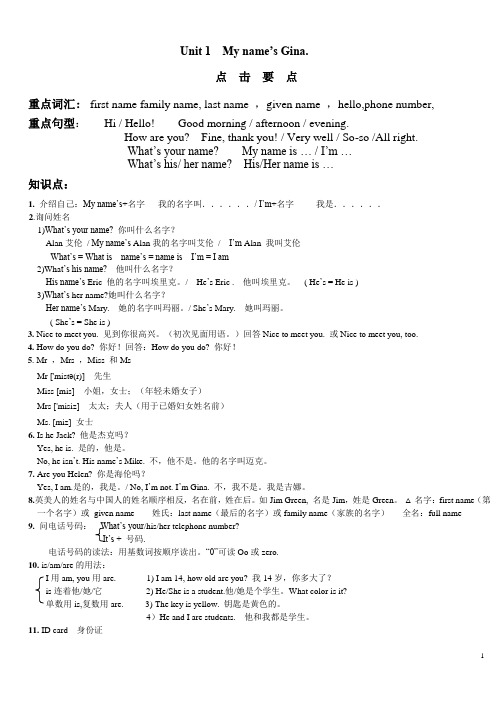
Unit 1 My name’s Gina.点击要点重点词汇:first name family name, last name ,given name ,hello,phone number,重点句型:Hi / Hello! Good morning / afternoon / evening.How are you? Fine, thank you! / Very well / So-so /All right.What‘s your name? My name is … / I‘m …What‘s his/ her name? His/Her name is …知识点:1.介绍自己:My name‘s+名字我的名字叫....../ I‘m+名字我是......2.询问姓名1)What‘s your name? 你叫什么名字?Alan艾伦/ My name‘s Alan我的名字叫艾伦/ I‘m Alan 我叫艾伦What‘s = What is name‘s = name is I‘m = I am2)Wha t‘s his name? 他叫什么名字?His name‘s Eric 他的名字叫埃里克。
/ He‘s Eric . 他叫埃里克。
( He‘s = He is )3)What‘s her name?她叫什么名字?Her name‘s Mary. 她的名字叫玛丽。
/ She‘s Mary. 她叫玛丽。
( She‘s = She is )3. Nice to meet you. 见到你很高兴。
(初次见面用语。
)回答Nice to meet you. 或Nice to meet you, too.4. How do you do? 你好!回答:How do you do? 你好!5. Mr ,Mrs ,Miss 和MsMr ['mistə(r)] 先生Miss [mis] 小姐,女士;(年轻未婚女子)Mrs ['misiz] 太太;夫人(用于已婚妇女姓名前)Ms. [miz] 女士6. Is he Jack? 他是杰克吗?Yes, he is. 是的,他是。
冀教版初中英语七年级英语上册电子课本(2013年最新版)
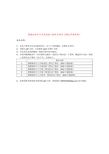
基本说明:
1、 本电子课本共分为 A,B 两部分。由于上传的限制,本篇为 A 部分; 2、 本篇为 pdf 文档,可以提供 word 及图片文档; 3、 本内容由美英桥整理,版权归相关的出版社; 4、 本系列冀教版初中(河北教育出版社)英语电子课本是一个系列,覆盖初中从初一到初 三的所有电子课本(电子书) ,具体如下: 课本内容 1 2 3 4 5 冀教版初中七年级英语上册电子课本(2013 年最新版) 冀教版初中七年级英语下册电子课本(2013 年最新版) 冀教版初中八年级上册英语电子课本(2013 年最新版) 冀教版初中八年级下册英语电子课本(2013 年最新版) 冀教版初中九年级全一册英语电子课本(2件 2487452826@ 进行索取。
新版七年级上册英语单词表(2013)

新版七年级上册英语单词表Starter Unit 1good /gud/ adj. 好地morning /'mɔ:niŋ/ n. 早晨;上午Good morning! 早上好!hi /hai/ interj. (用于打招呼>嗨;喂hello /hə'ləu/ interj. 你好;喂afternoon /,a:ftə'nu:n/ n. 下午Good afternoon! 下午好!evening /'i:vniŋ/ n. 晚上;傍晚Good evening! 晚上好!how /hau/ adv. 怎样;如何are /a:/ v. 是you /ju:/ pron. 你;你们How are you? 你好吗?I /ai/ pron. 我am /æm/ v. 是fine /fain/ adj. 健康地;美好地thanks /θæŋks/ interj.&n. 感谢;谢谢OK /əu'kei/ interj.& adv. 好;可以Starter Unit 2what /wɔt/ pron.&adj. 什么is /iz/ v. 是this /ðis/ pron. 这;这个in /in/ prep. (表示使用语言、材料等>用;以English /'iŋgliʃ/ n. 英语adj. 英格兰地;英语地in English 用英语map /mæp/ n. 地图cup /kʌp/ n. 杯子ruler /'ru:lə/ n. 尺;直尺pen /pen/ n. 笔;钢笔orange /'ɔrindʒ/ n. 橙子jacket /'dʒækit/ n. 夹克衫;短上衣key /ki:/ n. 钥匙quilt /kwilt/ n. 被子;床罩it /it/ pron. 它a /ə/ art. (用于单数可数名词前>一(人、事、物> that /ðæt/ pron. 那;那个spell /spel/ v. 用字母拼;拼写please /pli:z/ interj. (用于客气地请求或吩咐>请Starter Unit 3color /'kʌlə/ n. (=colour> 颜色red /red/ adj.& n. 红色<地)yellow /'jeləu/ adj.& n. 黄色<地)green /gri:n/ adj.& n. 绿色<地)blue /blu:/ adj.& n. 蓝色<地)black /blæk/ adj.& n. 黑色<地)white /wait/ adj.& n. 白色<地)purple /'pə:pl/ adj.& n. 紫色<地)brown /braun/ adj.& n. 棕色<地);褐色<地)the /ði。
- 1、下载文档前请自行甄别文档内容的完整性,平台不提供额外的编辑、内容补充、找答案等附加服务。
- 2、"仅部分预览"的文档,不可在线预览部分如存在完整性等问题,可反馈申请退款(可完整预览的文档不适用该条件!)。
- 3、如文档侵犯您的权益,请联系客服反馈,我们会尽快为您处理(人工客服工作时间:9:00-18:30)。
2013年七年级英语(下)复习提纲Unit1 Can you play the guitar?play the guitar 弹吉他play the piano 弹钢琴play the drums 敲鼓play chess 下象棋speak English 说英语speak a little English 说一点英语 say it in English 用英语说它what club 什么俱乐部join the art club 加入艺术俱乐部join the basketball club加入篮球俱乐部join the swimming club加入游泳俱乐部play the guitar well 弹吉他弹得好be good with sb和某人相处的好be good for···对·····益处 be good at···擅长······help sb with sth 帮助某人干某事help kids with swimming帮孩子们游泳Help my mother do houseworkdo Chinese kung fu表演中国功夫 be in参加,加入call sb at + 电话号码给某人打电话拨打···号have an e-mail address 有电子邮件的地址a little 一点(后接不可数名词)in the music room 在音乐教室里show sth to sb = show sb sth 把某物给某人看二.句型1、can+动词原形,它不随主语和数而变化。
(1)含有can的肯定句:主语+can+谓语动词的原形+其他。
(2)变一般疑问句时,把can提前:Can+主语+动词原形+其他?肯定回答:Yes,主语+can。
否定回答:No,主语+can't.(3)含有can的否定句:主语+can't+动词的原形+其他。
(4)含有can的特殊疑问句:特殊疑问词+can+主语+动词原形+其他?2、may+动词的原形。
(may为情态动词)一般疑问句是把may提前,肯定回答是:Yes,主语+may。
否定回答是:No,主语+mustn't。
或please don't。
join+某个组织,俱乐部,party,参军,党派等“加入”Join sb. “参加到某人中” join in (doing)sth “加入做......,参加某个活动”Join in=take part in +活动,比赛3、说某种语言:speak+语言4、play+球、棋、牌;play+the+乐器。
5、擅长于(做)什么:be good at +名词/动ing6、帮助某人做某事:help sb. (to ) do sth. help sb. with sth.7、我能知道你名字吗?May I know your name?8、想要做什么:want to do sth 例如:I want to learn about art.9、What club do you want to join?I want to join the chess club and the basketball club.10、What club does Tom want to join? He wants to join the swimming club .11、He can‟t play the violin or the piano. Can you help kids with swimming?12、Why do you want to join the English club? Because I want to learn English well. 1. — Can you play the guitar? 你会弹吉他吗?—Yes, I can. 是的,我会。
—No, I can‟t. 不,我不会。
①情态动词can的用法:情态动词无人称和数目的变化,不能独立使用作谓语,后面必须接动词原形,情态动词和动词原形一起构成谓语。
常用的情态动词有:can, may, must, need。
含情态动词的句子一般疑问句是把情态动词提到句首,否定句是在情态动词后加not。
②play the guitar“弹吉他”,play后加乐器名词时,乐器名词前要加the,“play + the+ 乐器”表示“弹奏某种乐器”。
play后加球类名词时,球类名词前不加the,“play +球类名词”表示“踢、打某种球”。
2. Can you speak English? 你会说英语吗?speak English“说英语”,“speak + 语言”表示“说某种语言”。
say it in English “用英语说它”,如:Can you say it in English?3.I want to join the art club. 我想加入艺术俱乐部。
(1).join是动词,意为“参加,加入”,后面接表示团体、俱乐部或组织的词作宾语,意为“加入某种团体、俱乐部或组织,并成为其中的一员”。
①若想表示加入某项活动、聚会、比赛等时,要加介词in。
②join还可以用于“join sb ( in doing sth)”结构中,意为“加入到某人中(一起做某事)”。
(2).对俱乐部的名称进行提问时,疑问词用What club,如:I want to join the art club.对划线部分进行提问时,答案是:What club do you want to join?4. What can you do? 你会干什么?What can you do? 是对主语会干的动作进行提问。
如:He can play the piano.(对划线部分进行提问)答案是:What can he do?5. Are you good with kids? 你和孩子们相处的好吗?be good with sb 意为“和某人相处的好”,be good for··· 意为“对······有益处”,be good at···意为“擅长······”6. Come and join us!来加入我们吧!Come and join us!是祈使句,以动词原形开头。
come 和join 是并列关系,用连词and 相连。
7. Can you help kids with swimming? 你能帮助孩子们游泳吗?help sb with sth / doing sth 意为“帮助某人干某事”8. Musicians Wanted for School Music Festival为学校的音乐节招聘音乐家职业名词+ wanted表示“招聘···”9. Can you play the piano, the trumpet, the drums or the guitar?你会弹钢琴、吹喇叭、敲鼓还是会弹吉他?这是一个选择疑问句,并列的选项用or连起来,选择疑问句不能用Yes或No回答,只能答其中的一个选项。
如:—Are you in Class 1 or Class 2? —I‟m in Class 1. / I‟m in Class 2.10.We want two good musicians for our rock band. 我们想为我们的摇滚乐队招聘两个音乐家。
for our rock band意为“为我们的摇滚乐队“11.I can do Chinese kung fu. 我会表演中国功夫。
do Chinese kung fu意为“表演中国功夫”,其中的do是实意动词。
12.You can be in our school music festival. 你可以参加我们学校的音乐节。
be in意为“参加,加入”13.Please call Zhang Heng at 622-6033. 请给张恒打电话拨打622-6033。
call sb at + 电话号码意为“给某人打电话拨打···号14. What‟s your address? 你的地址在哪里?问“你的地址在哪里?”疑问词是what而不是where. 如:What‟s your e-mail address?15.Can you play the guitar well? 你弹吉他会弹得很好吗?play the guitar well “弹吉他弹得好”,well是good 的副词,用来修饰实义动词play,修饰实义动词要用副词。
e and show us. 来出示给我们看。
show sth to sb = show sb sth “把某物给某人看”如:Show your photo to me.= Show me your photo.Unit2 What time do you go to school?1、what time和when引导的特殊疑问句。
(1)对时间提问用what time,也可以用when。
询问钟点时用what time,询问日期、月份、年份时用when。
(2)询问做某事的时间时,两者可以互换。
(3)其他询问时间的句子:What's the time? =What time is it?现在几点了?时刻表达法:顺读法和逆读法。
(1)顺读法:“钟点+分钟”直接读数字。
(2)逆读法:借助介词past或to表示,要先说分再说钟点。
A.当分钟不超过30分钟时(包括30分钟),即<或=30,用past表示。
其结构为:“分钟+past+整点” 意为“几点过几分”。
B.当超过30分钟时,即>30,用to表示。
其结构为:“所差分钟(即60—所过分钟数)+to+下一个整点”,to译成“差”,差几分钟到几点。
C.当分钟为30分钟用half表示,当分钟为15分钟用a quarter。
2、always 总是>usually 通常>often常常>sometime 有时3、Watch+TV、球赛“观看,观赏”,特指长时间注视。
See+电影、医生“看见”,强调看的结果。
Look “看”,强调看的动作,look后接宾语时要用介词at。
